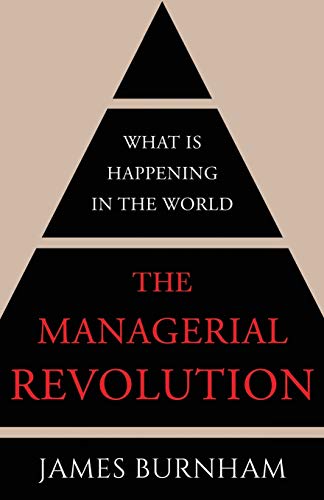James Burnham’s managerialism eighty years later

In response to recent interest, Branko Milanovic explores whether Burnham’s ideas have stood the test of time.
Like everybody who has studied Marxism from a relatively young age I encountered many quotes of, or comments on, James Burnham's “The Managerial Revolution”. I was quite familiar with Burnham’s ideas but I have not read the book. I don't think that I would have read it, now in 2024, eight-four years after its publications, were it not for the fact that his ideas have been to some extent resuscitated recently. I will mention it in more detail further in the article.
The ideas that Burnham expounded in his 1940 book were to a large extent contradicted by the events which took place during the Second World War. His predictions were entirely wrong. But the predictions are only a secondary, and I think rather unimportant, part of the book. Burnham’s key idea is that the capitalist system is being gradually replaced by “managerialism”, a new social system where private property is nationalized and the real ruling class is composed of state-appointed or state-approved managers of companies. Capitalists, if they still exist, play a purely passive role. The ideology of sanctity of private property disappears.
Burnham’s thesis was revived in a somewhat different form in the 1960s when the idea of convergence between capitalism and socialism became popular. John Kenneth Galbraith’s “The new industrial state” could be seen as an extension or elaboration of Burnham’s original thesis. Raymond Aron at the same time also wrote about the industrial societies where the type of ownership (state or private) was less important, and managers run the system, determine prices and quantities, and eventually take full control. Industrial societies, whether of the Soviet or American type, required the same type of management, Aron thought. Andrei Sakharov, the famous physicist in the Soviet Union, expressed the same ideas. Technocracy, in the language of the 1960s, would rule. But before I discuss Burnham revival or “revival” I think it is important to summarize his key arguments since they may not be as well known today as they used to be.
 The book is written in a very unappealing style. It reads like a Stalinist textbook. There are indeed many stylistic similarities between Burnham and Stalin. The early chapters that lay out the main features of capitalism and socialism are written dogmatically and contain almost no reference to any other author. Only Machiavelli is mentioned once and Marx, unavoidably, in passing a couple of times, but without any direct quotes. Burnham’s dogmatic style however has the advantage of being extremely clear, and probably to underline that Burnham at times uses the numbering of paragraphs. These parts read like a textbook of an evening class for the first-year students in Marxism.
The book is written in a very unappealing style. It reads like a Stalinist textbook. There are indeed many stylistic similarities between Burnham and Stalin. The early chapters that lay out the main features of capitalism and socialism are written dogmatically and contain almost no reference to any other author. Only Machiavelli is mentioned once and Marx, unavoidably, in passing a couple of times, but without any direct quotes. Burnham’s dogmatic style however has the advantage of being extremely clear, and probably to underline that Burnham at times uses the numbering of paragraphs. These parts read like a textbook of an evening class for the first-year students in Marxism.
The book’s analytics is entirely Marxist. As I mentioned, Burnham begins with a very simplified analysis of what is capitalism and how it has developed within the womb of the feudal society and then discusses Marxist notion of a system that would replace capitalism, namely socialism. In everything that touches on capitalism Burnham is basically 100% in agreement not only with Marx but with Lenin and The Third International. He frequently uses historical analogies highlighting the similarities between the way that capitalism was born within a feudal society, and managerialism is being born within the capitalist society. Some of the historical examples may be right, but they are also cherry-picked and not discussed at any depth or length.
Where Burnham dramatically departs from Marxism is in his view that the system that would replace capitalism will not be socialism but “managerialism”. Socialism is defined, quite reasonably, as a classless, free, and internationalist society. He observes throughout in the book and especially in the chapter written about the Soviet Union (always called just “Russia”) that none of these three features holds true for the Soviet Union. It is a class society where managers and party functionaries have political power, de facto control instruments od production, and have preferential position in the distribution of national output (the latter two points are Burnham’s general definition, applying to capitalism as well, of the ruling class). People are not free but subject to a totalitarian system while workers’ power in enterprises ended two years after the Revolution. Soviets are politically irrelevant, toothless façades. There are almost no traces of internationalism because managerial ruling class is interested in national aggrandizement and national power. Thus the Soviet Union is not a socialist, but a managerial society. It is, in fact, Burnham argues, the first managerial society in history, built on economically underdeveloped foundations; yet a society that is already (at the time of writing) followed by other nascent managerial societies of Fascist Italy, Nazi Germany and New Deal’s USA.
Burnham rejects the idea that socialism would replace capitalism because workers cannot run complex economic systems nor can the ideals of socialism be attained so long as the level of economic development is not sufficiently high. But what is sufficiently high may be forever unreachable. Burnham holds the view that human wants and needs are not limited. Hence the abundance upon which socialism and ultimately communism are predicated is simply not around the corner, nor it may ever be.
Further, socialist internationalism (socialism’s third formal characteristic) would imply a world government which is impossible given enormous variety in income, religion, value systems and beliefs that exist between nations. Consequently, neither abundance nor internationalism can be achieved. Therefore, socialism is a utopia.
What is not a utopia and will replace capitalism is managerialism. Burnham devotes a significant part of the book to explaining how managers gradually displace capitalists in the running of large enterprises, how they increasingly see capitalists (who spend most of their time in Florida playing golf) as parasites. All short- and long-term business decisions are made by managers with capitalists playing almost no role.
Capitalists’ abdication is not voluntary though. When they tried to run companies according to the principles of profit, they ran countries aground. They created mass unemployment (“mass unemployment means that the given type of social organization has broken down, that it cannot any longer provide its members with socially useful functions”, p. 28), huge unutilized piles of money that were never invested, low growth, and recurrent economic crises. Thus capitalism, according to Burnham, is increasingly showing itself unable to solve economic problems in complex modern societies. Public discontent with the economic system is rising, and unwillingness to fight for it is shown, among other things, by the very low rate of voluntary recruitment in the British and U.S. armies in the beginning of the war.
The only way to prevent the collapse is therefore to bring in the state. Burnham here discusses Keynesianism (without ever mentioning its author), nationalization of various segments of the economy, and introduction of sectoral planning. An increasing share of the economy is run by different government bodies. Burnham mentions a bewildering array of newly created outfits under Roosevelt’s administration: “BLRB, SEC, ICC, AAA, TVA, FTC, FCC, the Office of Production Management (what a revealing title!)” (p. 136). He notes that Roosevelt in his 1940 reelection campaign never used the terms “businessmen”, “owners” or “bankers”, replacing them with “technicians in industry” and “managers” (p. 188). What is really happening, writes Burnham, is a gradual replacement of the private-property-based rule of capitalists by the rule of government technocrats, creeping nationalization, or at least strong constraints on the use of private property. The New Deal United States is moving toward managerialism, joining there the more advanced managerial societies of the USSR, Germany, Italy, Japan, and France (after the defeat of June 1940).
This is all written in 1940, after the Ribbentrop-Molotov pact, partition of Poland and defeat of France, and Burnham’s ideas seem to align well with the reality as the three countries discussed (USSR, Germany and the US) display strong economic similarities. Burnham was not entirely original. Very similar ideas about the inevitability of socialism (but not of managerialism) can be found in Schumpeter’s “Capitalism, Socialism and Democracy” published only a year after Burnham’s book. One can see them too in Hayek's “Road to Serfdom”, written in the 1940s and published in 1945. In all key economic aspects it hardly differs from Burnham. The only difference is that Hayek’s book was strongly normative, in the sense that the greater role of the state was seen as something intrinsically malign. Burnham, on the other hand, takes great pains to insist that his analysis is value-free and that he is simply discussing the way in which different economic and political systems succeed each other. Any ideas of inserting moral judgments in historical evolution are unscientific.
It is well known that Burnham's prediction that the Second World War would lead to the division of the world in three large areas ruled respectively by the United States, Germany and Japan did not come to pass. In effect, when we look at the changes in the world in the past eighty years the very opposite of what Burnham expected happened. Not only did the Soviet Union and the United States get together in order to defeat Germany, Italy and Japan, but the United States reverted strongly to capitalist ideology, jettisoning many elements of what Burnham calls “managerialism”. In addition, after a protracted Cold War, the conflict with socialism was solved to the advantage of capitalism. Even China became economically capitalist, and the world thus got “unified” in terms of the real-existing economic practice into one, as I argue in “Capitalism, Alone”. If one looks at the situation of the world ever since 1989, Burnham has to be seen as wrong in practically everything: managerialism did not replace capitalism, capitalism is triumphant, the three great powers did not divide the world amongst themselves.
Yet the situation nowadays may be thought by some a bit different because certain aspects of Burnham's managerialism can be detected in China. I do not agree with the idea that China is an example of the managerial society. Most of the value added, most of the investments, and most of the employment in China is done by the private sector. But some aspects of state control over the private sector and consequently inability of the capitalist class to control the state, can be seen as the ideal-typical features of Burnhamite managerial society.
This was the point recently made by N. S. Lyons in his essay which forecasts the United States converging onto the Chinese model. The convergence however is defined only in ideological terms. Lyons sees “woke” ideology as a form of elite thought control that is not different from the elite thought control exercised by the Communist Party of China. Whatever we make of “wokeism”, the idea that the US is moving towards the managerial society is entirely wrong, as a short sketch of Burnham’s ideas provided here shows. Burnham grounds the definition of both capitalist and managerial societies in the relations of production (“The instruments of production are the seat of social domination; who controls them…controls society, for they are the means whereby society lives”, p. 93), not in the ideology that is completely dissociated from the production side. The managerial society, according to Burnham, can exist only when the ownership of most means of productions is vested in the state, and the managerial class plays the dominant role. None of it true in the United States today, and Lyons’ attempt to enlist Burnham and the “managerial society” to his point of view is either a misunderstanding of Burnham or misappropriation of his ideas. The American dominant class is imbued by a strong capitalist spirit, it defends its property, and controls the government.
Thus, although Burnham was wrong in his predictions, reading him is still valuable for two reasons. First, it makes us reflect how a theory, written in 1940, looked appealing both in the explanation of the origin of the managerial society, its grounding in incontestable economic processes, and in showing strong correspondence with the events observable then—and yet be wrong in only five years. The lesson one can draw is how, in a very fluid economic and international environments as is the case today, theories that seem sensible in the morning may turn out to be wrong in the evening.
Second, reading Burnham today, and especially so reading the parts where he insists that one of the rationales for the managerial revolution lies in its ability to provide higher rates of economic growth for the majority of the population than capitalism, might be relevant if capitalism fails to generate steady growth for its middle class. Then different forms of managerialism, replacing private property, or limiting the role of financial capitalists, may become attractive. And if that happens, it could bring Burnham back.
This first appeared on Branko's blog and were reposted with permission.


